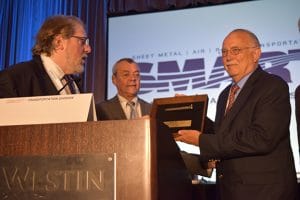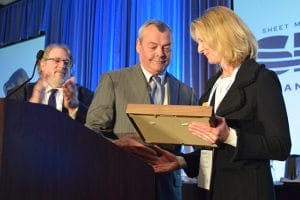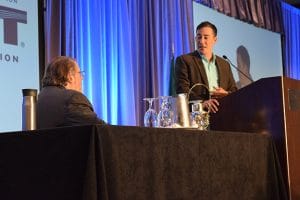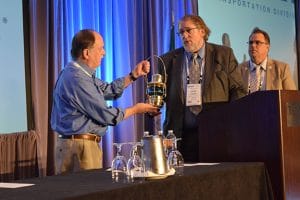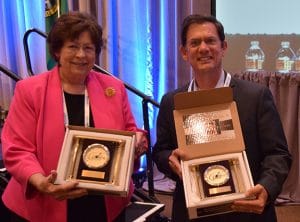Quality of life has been front of mind for railroad employees and SMART Transportation Division for years. It was the heart of the most contentious fights in last year’s national rail negotiations and continues to be the ultimate goal for everything your union is working to accomplish.
In Washington state, TD State Legislative Director (SLD) Herb Krohn has led the charge to gain protected unpaid time off for rail workers so, like most other workers in our nation, we don’t have to work while sick and can take leave to care for sick loved ones without fear of employer discipline and termination.
Krohn’s latest bill before the Washington Legislature is ESSB 5267, also known as the “Safe UNPAID Leave Act for Washington Railroad Workers” and is sponsored by state Sen. Patty Kuderer (D-48th District).
This legislation simply protects all railroad employees who mark off duty for their own health, the health of family members, fatigue or medical appointments. It protects railroaders for up to 90 unpaid days per year for these scenarios free from discipline or termination by railroad company employers.

“The goal of this legislation is to provide job protections for railroaders to allow us all to be able to take care of ourselves and our loved ones without fear of discipline or losing our careers, not just to be a nameless cog in the wheel of the corporate money- machines of the railroad industry,” Krohn said.
Although ESSB 5267 would allow absences totaling up to 90 days each year, it does have some limitations. The first is that a carrier can request doctors’ notes for absences longer than five days in a row. Employees then have 30 days to provide the document to ensure workplace protections. Secondly, no use of time longer than 15 consecutive days is protected by this law, so employees who need additional time must request medical leaves of absence or FMLA.
Brother Krohn is known throughout SMART-TD as an innovator when it comes to the legislation he’s advanced in Washington state. The verbiage he has used for two-person crew legislation, among many other key issues, has widely been a template or best-demonstrated practice to guide SLDs’ progress around the country. As he’s achieved success, SMART-TD hasn’t been the only party that has taken notice.
BNSF, Union Pacific, and the short-line railroads of Washington have sent an army of consultants and lobbyists to counter Brother Krohn’s influence in Olympia. This is where our members come into play.
With the groundwork laid by the Washington State Legislative Board and other members of rail labor and legislators’ open ears, ESSB 5267 sits in a good position for passage in Washington’s House of Representatives after passing the Senate.
But this week, the fate of 90 available days of sick leave is on the line. Rail lobbyists have circled the wagons and likely are doing everything they can to influence your representatives with their bottomless checkbooks so they can continue to discipline and terminate rail workers for unpaid absences.
SMART-TD members need to apply the same influence with their voices. It’s time for us in the rail community to stop wishing “someone” would do something about our lack of time away from work, and start being that “someone.”
Please consider sharing any adverse experiences you’ve had regarding carriers’ attendance policies by calling them or emailing them.
With either method, letting your voice be heard and reminding them that your support at the ballot box should be taken into consideration will influence their vote on this important piece of legislation more than the carriers’ empty arguments can!

